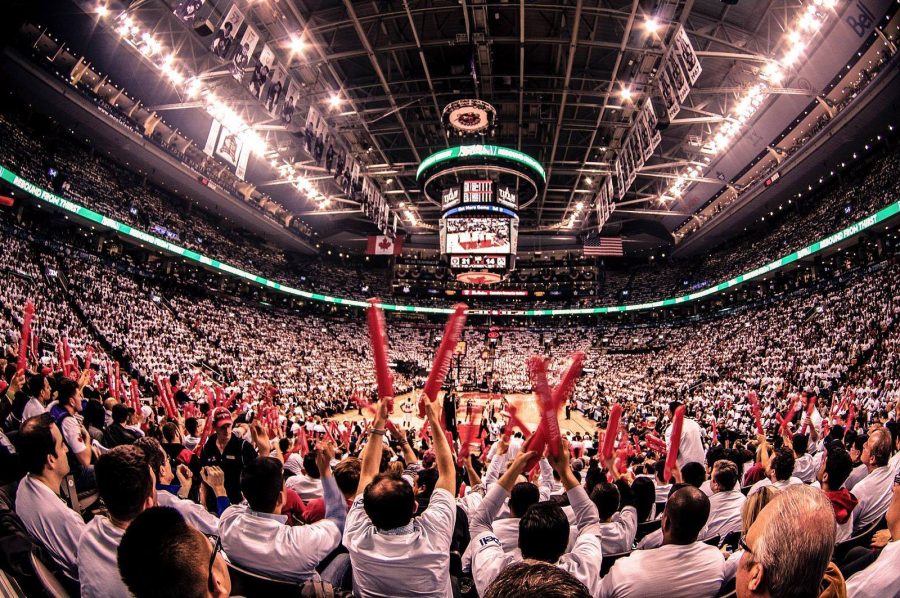Super Teams: Why the imbalance of NBA teams hurts the game and the fans
Wikimedia Commons
Toronto Raptors fans cheer on their team during the NBA playoffs by waving stick-shaped balloons in their team colors. Basketball teams can generate huge amounts of value for local businesses and communities.
November 17, 2016
On July 4, Kevin Durant shocked the world with his announcement of his decision to sign with the Golden State Warriors. While Warriors fans were thrilled with the acquisition, fans of other teams complained about the signing, believing it unfair for one team to have so many star players.
This definitely isn’t the only multi-superstar team in recent history. LeBron James, Dwyane Wade and Chris Bosh started the trend in 2010 when they formed the “Big 3” in Miami. More recently, James returned to the Cleveland Cavaliers and teamed up with Kyrie Irving and Kevin Love in 2014.
This year, the NBA’s new TV deal was put into effect and increased revenue for the league, which in turn increased the salary cap, or player budget, for each team. As a result, there was an unusually high amount of activity during free agency, the time period when teams can sign new players with expired contracts. As a result, large-market teams, like the Warriors, who would usually have little to no cap space, gained the freedom to sign high-value players like Durant.
While the formation of multiple super teams sounds like an exciting prospect, analysts and casual fans often forget about the small market teams that simply cannot afford these costly players. As a result, those teams are stuck in a continuous loop of signing low level players and cannot make the improvements necessary to become a legitimate contender for the championship.
The NBA has always been known to have a top tier group of teams that always make the playoffs, but the increase in salary cap has only widened the gap. This trend discourages fans of small market teams from continuing to support their team, as they do not have a good team to rally behind. With the emergence of social media, which often increases exposure for winning teams, it is not surprising to see many become “bandwagon” fans and choose to support winning teams instead of their home team. Fans who switch to supporting another team hurt their original team’s fan base and can divide their local communities because of these differences.
So, what needs to happen to have a more widely competitive NBA?
It all starts with altering the NBA Collective Bargaining Agreement (CBA). The CBA determines the the revenue split between the players and the owners. The current CBA allocates more revenue to the players, meaning the salary cap is higher. This benefits large market teams, whose owners would rather use the money to improve their team instead of keeping it in their pockets. In order for NBA teams to be more balanced, more of the revenue needs to be distributed to the owners, which will not only help fund small market teams that need the money but also lower the salary cap, decreasing the amount of star players a single team can have.
With fairer teams, the number of close and entertaining games throughout the season will increase and there will be more competition for the championship. Fans will also become more engaged with their local teams, and their communities can benefit immensely from the success of smaller teams. Local sports bars and sports shops selling team merchandise will gain more customers, which will help their businesses.
Just this past month when the Chicago Cubs broke a 108-year drought and won the World Series, the entire city celebrated their victory by holding multiple parades around the city, illustrating the unity of the city for its team. Fans helped local businesses by filling up local restaurants and bars after the parade and picking up local newspapers commemorating the victory.
The NBA can opt out of the current CBA deal on Dec. 15 and negotiate with the NBA Players Association for a new long-term deal. How the NBA responds to this issue will significantly affect the landscape of the league for years to come. They need to address the needs of smaller market teams, not only to improve the game, but for the sake of all the loyal fans and the communities of these teams so everyone may finally have something to cheer for.


















![“[Building nerf blasters] became this outlet of creativity for me that hasn't been matched by anything else. The process [of] making a build complete to your desire is such a painstakingly difficult process, but I've had to learn from [the skills needed from] soldering to proper painting. There's so many different options for everything, if you think about it, it exists. The best part is [that] if it doesn't exist, you can build it yourself," Ishaan Parate said.](https://harkeraquila.com/wp-content/uploads/2022/08/DSC_8149-900x604.jpg)




![“When I came into high school, I was ready to be a follower. But DECA was a game changer for me. It helped me overcome my fear of public speaking, and it's played such a major role in who I've become today. To be able to successfully lead a chapter of 150 students, an officer team and be one of the upperclassmen I once really admired is something I'm [really] proud of,” Anvitha Tummala ('21) said.](https://harkeraquila.com/wp-content/uploads/2021/07/Screen-Shot-2021-07-25-at-9.50.05-AM-900x594.png)







![“I think getting up in the morning and having a sense of purpose [is exciting]. I think without a certain amount of drive, life is kind of obsolete and mundane, and I think having that every single day is what makes each day unique and kind of makes life exciting,” Neymika Jain (12) said.](https://harkeraquila.com/wp-content/uploads/2017/06/Screen-Shot-2017-06-03-at-4.54.16-PM.png)








![“My slogan is ‘slow feet, don’t eat, and I’m hungry.’ You need to run fast to get where you are–you aren't going to get those championships if you aren't fast,” Angel Cervantes (12) said. “I want to do well in school on my tests and in track and win championships for my team. I live by that, [and] I can do that anywhere: in the classroom or on the field.”](https://harkeraquila.com/wp-content/uploads/2018/06/DSC5146-900x601.jpg)
![“[Volleyball has] taught me how to fall correctly, and another thing it taught is that you don’t have to be the best at something to be good at it. If you just hit the ball in a smart way, then it still scores points and you’re good at it. You could be a background player and still make a much bigger impact on the team than you would think,” Anya Gert (’20) said.](https://harkeraquila.com/wp-content/uploads/2020/06/AnnaGert_JinTuan_HoHPhotoEdited-600x900.jpeg)

![“I'm not nearly there yet, but [my confidence has] definitely been getting better since I was pretty shy and timid coming into Harker my freshman year. I know that there's a lot of people that are really confident in what they do, and I really admire them. Everyone's so driven and that has really pushed me to kind of try to find my own place in high school and be more confident,” Alyssa Huang (’20) said.](https://harkeraquila.com/wp-content/uploads/2020/06/AlyssaHuang_EmilyChen_HoHPhoto-900x749.jpeg)









